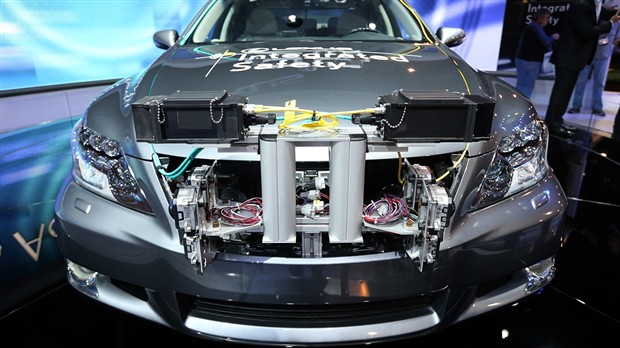UK sees driverless vehicles on British roads by next year
Published: August 01, 2014 | United Kingdom
Currently, as in many countries, autonomous vehicles are only allowed on private roads in the UK, in spite of the fact that UK Department for Transport had previously pledged to allow self-driving cars to be trialed on public roads by the end of 2013.
However, the driverless cars have been tipped to transform Britain’s transport network after the Government launched a £10 million competition to host a series of on-the-road trials. Business Secretary Vince Cable announced that driverless vehicles will be allowed on public roads in three UK cities in January next year.

Subsequently given a tour of a private test track in Nuneaton, Warwickshire, in a GPS-guided Ford Mondeo estate, Vince Cable confirmed the trials would last for up to three years. The technology is now there in the vehicles – we want to match it up with satellites so that potentially you get whole fleets of cars operating much more efficiently with less congestion said Vince cable.
UK cities can now bid for a share of a £10 million competition to host a driverless cars trial. The government is calling on cities to join together with businesses and research organisations to put forward proposals to become a test location.
Up to 3 cities will be selected to host the trials from next year (2015) – and each project is expected to last between 18 and 36 months and start in January 2015. The deadline for driverless car research applications will be October 1.
The basic announcement of the trial is as follows: DRIVERLESS cars could be weaving their way through the City’s streets in just six months. In an announcement, ministers unveiled a £10m plan to allow three cities the chance to test-run cars that drive themselves. Bids will be submitted jointly by cities, businesses and universities before three are chosen as test locations.
UK engineers, including a group at the University of Oxford, have been experimenting with driverless cars. But, concerns about legal and insurance issues have so far restricted the machines to private roads. Oxford has a long history of car-making and this could be taken to a whole new level. The city could become one of three places where driverless cars are tested on public roads. Oxfordshire County Council is considering a bid for the new government scheme which will allow Oxford University to test the automatic car it is creating. Also, The Mayor’s office has confirmed that London hopes to bid for one of the three positions to host the trails.
“Driverless cars have huge potential to transform the UK’s transport network – they could improve safety, reduce congestion and lower emissions, particularly CO2,” said the Transport Minister, Claire Perry, who committed to the regulatory review of road law.
There’s no doubt that autonomous vehicles are one of the fastest growing trend and technology innovation in connected cars market. Driverless cars are already in use in a number of countries, including America, Japan and Sweden. Google has also put its autonomous driving technology in cars built by other companies, including Toyota, Audi and Lexus. Other major manufacturers, including BMW, Mercedes-Benz, Nissan and General Motors, are developing their own models.
The debates is whether to allow autonomous cars, to abandon controls including a steering wheel and pedals and rely completely on the vehicle’s computer Or instead allow the machine to drive, but insist a passenger be ready to wrest back control at a moment’s notice.


